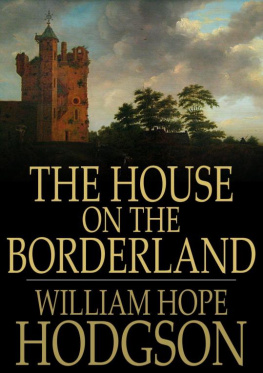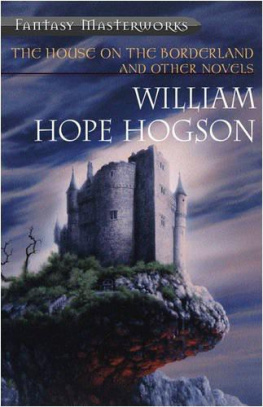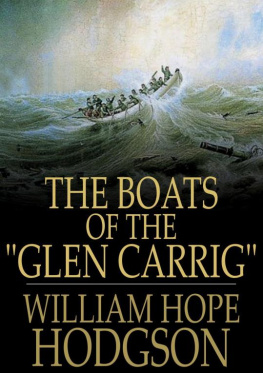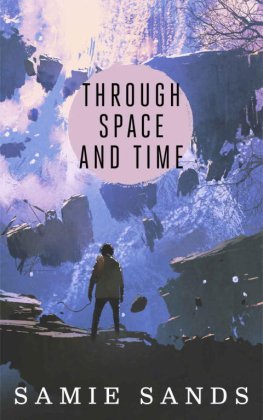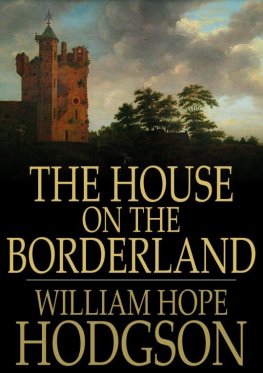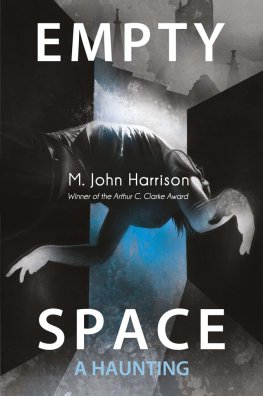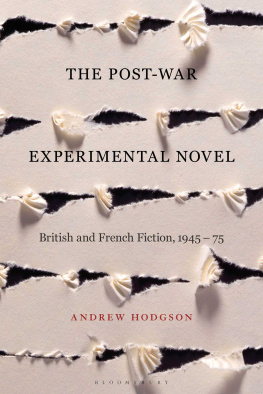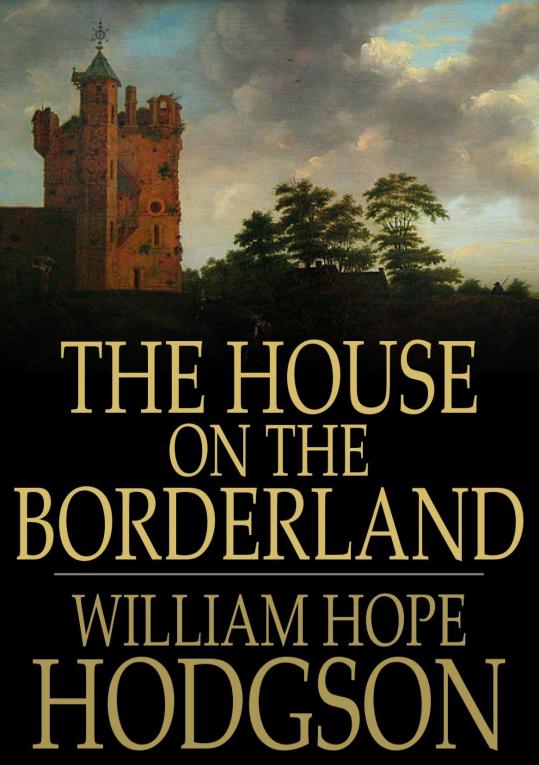THE HOUSE ON THE BORDERLAND
* * *
WILLIAM HOPE HODGSON

*
The House on the Borderland
First published in 1908.
ISBN 978-1-775411-06-2
2009 THE FLOATING PRESS.
While every effort has been used to ensure the accuracy and reliability of the information contained in The Floating Press edition of this book, The Floating Press does not assume liability or responsibility for any errors or omissions in this book. The Floating Press does not accept responsibility for loss suffered as a result of reliance upon the accuracy or currency of information contained in this book. Do not use while operating a motor vehicle or heavy equipment. Many suitcases look alike.
Visit www.thefloatingpress.com
Contents
*
*
From the Manuscript discovered in 1877 by Messrs. Tonnison andBerreggnog in the Ruins that lie to the South of the Village ofKraighten, in the West of Ireland. Set out here, with Notes.
TO MY FATHER(Whose feet tread the lost aeons)
Open the door,
And listen!
Only the wind's muffled roar,
And the glisten
Of tears 'round the moon.
And, in fancy, the tread
Of vanishing shoon
Out in the night with the Dead.
"Hush! And hark
To the sorrowful cry
Of the wind in the dark.
Hush and hark, without murmur or sigh,
To shoon that tread the lost aeons:
To the sound that bids you to die.
Hush and hark! Hush and Hark!"
Shoon of the Dead
Author's Introduction to the Manuscript
*
Many are the hours in which I have pondered upon the story that is setforth in the following pages. I trust that my instincts are not awrywhen they prompt me to leave the account, in simplicity, as it washanded to me.
And the MS. itselfYou must picture me, when first it was given into mycare, turning it over, curiously, and making a swift, jerky examination.A small book it is; but thick, and all, save the last few pages, filledwith a quaint but legible handwriting, and writ very close. I have thequeer, faint, pit-water smell of it in my nostrils now as I write, andmy fingers have subconscious memories of the soft, "cloggy" feel of thelong-damp pages.
I read, and, in reading, lifted the Curtains of the Impossible thatblind the mind, and looked out into the unknown. Amid stiff, abruptsentences I wandered; and, presently, I had no fault to charge againsttheir abrupt tellings; for, better far than my own ambitious phrasing,is this mutilated story capable of bringing home all that the oldRecluse, of the vanished house, had striven to tell.
Of the simple, stiffly given account of weird and extraordinary matters,I will say little. It lies before you. The inner story must be uncovered,personally, by each reader, according to ability and desire. And evenshould any fail to see, as now I see, the shadowed picture and conceptionof that to which one may well give the accepted titles of Heaven and Hell;yet can I promise certain thrills, merely taking the story as a story.
WILLIAM HOPE HODGSON December 17, 1907
I - The Finding of the Manuscript
*
Right away in the west of Ireland lies a tiny hamlet called Kraighten.It is situated, alone, at the base of a low hill. Far around therespreads a waste of bleak and totally inhospitable country; where, hereand there at great intervals, one may come upon the ruins of some longdesolate cottageunthatched and stark. The whole land is bare andunpeopled, the very earth scarcely covering the rock that lies beneathit, and with which the country abounds, in places rising out of the soilin wave-shaped ridges.
Yet, in spite of its desolation, my friend Tonnison and I had elected tospend our vacation there. He had stumbled on the place by mere chancethe year previously, during the course of a long walking tour, anddiscovered the possibilities for the angler in a small and unnamed riverthat runs past the outskirts of the little village.
I have said that the river is without name; I may add that no map that Ihave hitherto consulted has shown either village or stream. They seemto have entirely escaped observation: indeed, they might never exist forall that the average guide tells one. Possibly this can be partlyaccounted for by the fact that the nearest railway station (Ardrahan) issome forty miles distant.
It was early one warm evening when my friend and I arrived in Kraighten.We had reached Ardrahan the previous night, sleeping there in roomshired at the village post office, and leaving in good time on thefollowing morning, clinging insecurely to one of the typicaljaunting cars.
It had taken us all day to accomplish our journey over some of theroughest tracks imaginable, with the result that we were thoroughlytired and somewhat bad tempered. However, the tent had to be erected andour goods stowed away before we could think of food or rest. And so weset to work, with the aid of our driver, and soon had the tent up upon asmall patch of ground just outside the little village, and quite near tothe river.
Then, having stored all our belongings, we dismissed the driver, as hehad to make his way back as speedily as possible, and told him to comeacross to us at the end of a fortnight. We had brought sufficientprovisions to last us for that space of time, and water we could getfrom the stream. Fuel we did not need, as we had included a smalloil-stove among our outfit, and the weather was fine and warm.
It was Tonnison's idea to camp out instead of getting lodgings in one ofthe cottages. As he put it, there was no joke in sleeping in a room witha numerous family of healthy Irish in one corner and the pigsty in theother, while overhead a ragged colony of roosting fowls distributedtheir blessings impartially, and the whole place so full of peat smokethat it made a fellow sneeze his head off just to put it insidethe doorway.
Tonnison had got the stove lit now and was busy cutting slices of baconinto the frying pan; so I took the kettle and walked down to the riverfor water. On the way, I had to pass close to a little group of thevillage people, who eyed me curiously, but not in any unfriendly manner,though none of them ventured a word.
As I returned with my kettle filled, I went up to them and, after afriendly nod, to which they replied in like manner, I asked themcasually about the fishing; but, instead of answering, they just shooktheir heads silently, and stared at me. I repeated the question,addressing more particularly a great, gaunt fellow at my elbow; yetagain I received no answer. Then the man turned to a comrade and saidsomething rapidly in a language that I did not understand; and, at once,the whole crowd of them fell to jabbering in what, after a few moments,I guessed to be pure Irish. At the same time they cast many glances inmy direction. For a minute, perhaps, they spoke among themselves thus;then the man I had addressed faced 'round at me and said something. Bythe expression of his face I guessed that he, in turn, was questioningme; but now I had to shake my head, and indicate that I did notcomprehend what it was they wanted to know; and so we stood looking atone another, until I heard Tonnison calling to me to hurry up with thekettle. Then, with a smile and a nod, I left them, and all in the littlecrowd smiled and nodded in return, though their faces still betrayedtheir puzzlement.

